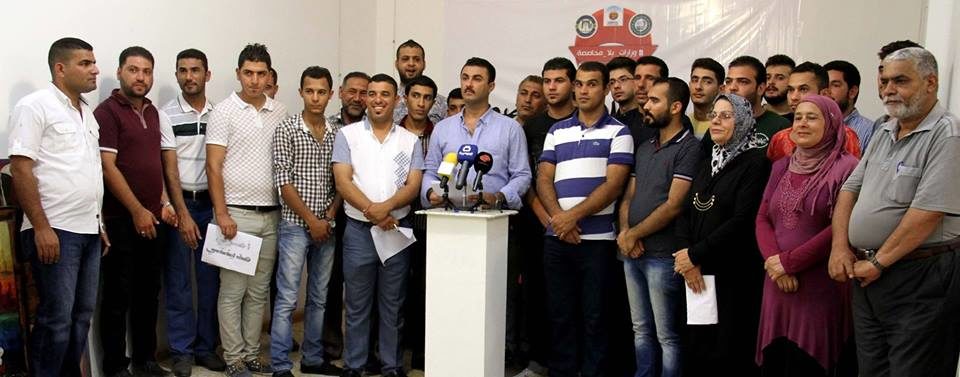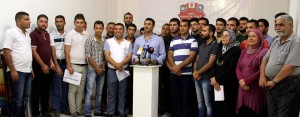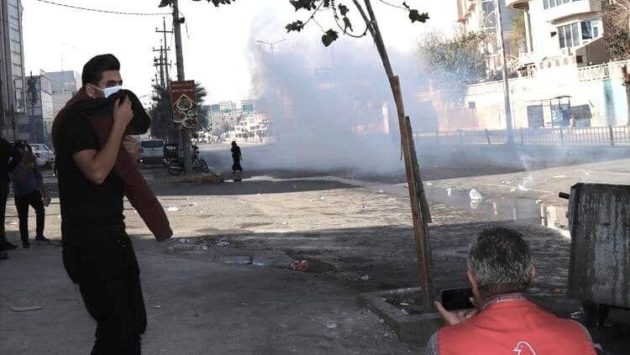Ministries without Quotas: A campaign that calls for the end a divisive and corrupt system!
Campaign activists vow to continue campaigning and will not stop at only four ministries!
Baghdad – September 2014
The Ministries Without Quotas campaign held a conference on Saturday at the Hall of “Culture For All” Association, to discuss the performance of the Ministries of Education, Higher Education, Culture, and Youth and Sports under the current sectarian quota system. According to this system, leaders of political groups inside the Iraqi council of representatives divide ministries on the basis of sectarian quotas: one ministry is for Sunnis, a different one is for Shia, and another one for Kurds. Because ministers are selected by the sects themselves, and not the prime minister, the campaign assumes that the current system of quotas is a major cause of corruption. The conference explored what might be made of these ministries were the quota system abolished. It was attended by a large and diverse group, made up of activists, academics and youth, as well as political and parliamentary figures.
The conference discussed four papers presented (respectively) by Dr. Saad Salloum (on the state of Higher Education in Iraq); Dr. Amer Al-Qaisi (on Education); the famous athlete, Menem Jaber (on the state of Youth and Sports); and finally, Dr. Abdu Jassim Al-Saadi (on the state of culture). Dr. Bushra Al-Obeidi, presented arguments about the importance of abandoning the quota system, and of promoting the full recognition of human rights.
The following press statement about the campaign was released at the end of the conference (conference papers will be published later):
The Ministries without Quotas campaign continues to work on its goal of abolishing sectarian quotas within government ministries. Today’s conference is only an initial, evaluative step towards an Iraq entirely without quotas. Our campaign requests that four ministries (namely, the Ministry of Higher Education, the Ministry of Education, the Ministry of Youth and Sports and the Ministry of Culture) be led by technocratic professionals with competence and experience — and this includes not only the person leading each ministry, but should be reflected in all the ministry’s staff and associates, representatives, general managers, advisers and others.
Today we discussed a plan of action, a first step towards freeing the ministries from the quota system, and exploring what might be made of these ministries outside the imposition of quotas. Doing away with quotas would leave Iraq in a state utterly different from that of the past 10 years, during which, we Iraqis, have been the victims of the corruption inherent in the dysfunctional quota system. While we do not want dwell on the past, we must be aware that it will become our future unless there is a real push for change. This requires recognition and influence on the political stage. Given this, the Ministries without Quotas campaign was launched in much the same way as other campaigns aimed at a more just Iraq, for example, “Do not steal my voice” and “Reduce the gap between the salaries of officials and other employees” as well as the “Campaign to End the Open Session of the Iraqi Council of Representatives”;. These campaigns have had a clear impact in diverting Iraq from the path that has led to so many of the current crises. Our campaign has triggered a wide range of activities in various provinces (Basra, Diwaniyah, Najaf, Babil, Wasit, Dhi Qar, Diyala) and has been joined by more than 10,000 citizens, all working in different ways to dismantle the current quota system. Based on this, we will focus on the following goals:
- To free those ministries mentioned above from the sectarian – ethnic mindset that has been so divisive, and to ensure that they are led instead by independent and professional persons experts in their fields, who can efficiently manage these complex institutions.
- To reactivate these same ministries so that they may perform the important task of serving all Iraqi citizens, without any sectarian or ethnic bias, and with a clearly articulated method and advanced planning.
- To increase pressure on the decision-makers [in government?] to eliminate the quota system, and to adopt in its place a system that values competence, experience and integrity.
- To activate the voice of civilians so that everyday Iraqi people can become an influential force in decision-making by contributing to the formation of new programs that do not divide people according to sectarian or ethnic lines.
We also emphasize our right to extend our rejection of the quota system to the rest of the governmental ministries.





